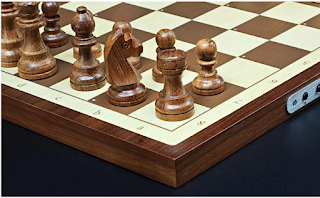Chess, a game of strategy, intellect, and foresight, has been a timeless pursuit for enthusiasts around the world. Over the years, the advent of technology has transformed the way we play chess, giving rise to the computer chess board. This ingenious fusion of the classic game and modern technology has opened up a new dimension for chess lovers, enabling them to sharpen their skills, challenge opponents from around the globe, and dive deep into the world of chess like never before. In this blog, we'll explore the evolution and significance of computer chess boards and delve into how they are revolutionizing the way we experience this ancient game.
The Rise of Computer Chess Boards
The concept of
computer chess board can be traced back to the mid-20th century when computer
pioneers like Alan Turing and Claude Shannon began exploring the possibility of
creating chess-playing machines. However, it wasn't until 1997 that IBM's Deep
Blue made history by defeating world champion Garry Kasparov. This watershed
moment marked the beginning of a new era for chess, where computers became
formidable opponents and invaluable tools for human players.
Today, computer
chess boards come in various forms, ranging from software applications that you
can install on your personal computer to dedicated hardware devices with
built-in chess engines. These platforms not only allow you to play against
computer-generated opponents of varying skill levels but also enable you to
connect with chess enthusiasts worldwide for online matches.
The Advantages of Computer Chess Boards
- Accessibility: One of the primary
advantages of computer chess boards is their accessibility. You no longer
need a physical chess set and a human opponent to enjoy a game of chess.
With a computer chess board, you can play anytime, anywhere.
- Learning Tools: Computer chess boards
often feature built-in engines with adjustable difficulty levels, making
them excellent tools for improving your game. Beginners can practice
against easy opponents, while advanced players can face challenging AI
adversaries.
- Analysis and Feedback: After each game,
computer chess boards can provide detailed analysis of your moves, helping
you understand your strengths and weaknesses. This feedback can be
instrumental in enhancing your gameplay.
- Variety: You can explore a wide range
of chess variants and puzzles through computer chess boards, allowing you
to diversify your chess experience and experiment with new strategies.
- Online Community: Most computer chess
boards come with online capabilities, enabling you to connect with a
global community of chess players. You can compete in tournaments, join
clubs, and learn from fellow chess enthusiasts.
Conclusion
The computer chess
board has transcended the boundaries of traditional chess, making the game more
accessible, educational, and exciting. Whether you're a casual player looking
for a quick match or a serious chess enthusiast striving to reach new heights
in your chess journey, the computer chess board is a powerful ally in your
quest for mastery. So, dive into this fascinating world where ancient strategy
meets modern technology, and may your chess endeavors be as thrilling as they
are enlightening.








0 Comments